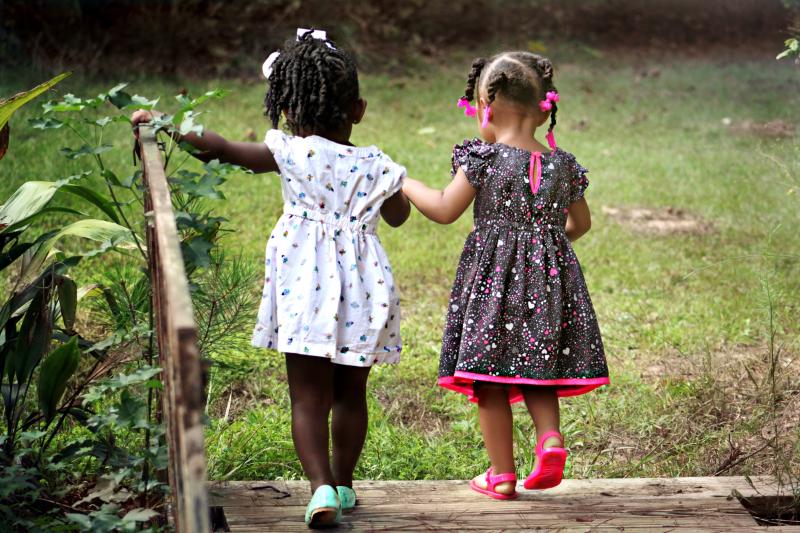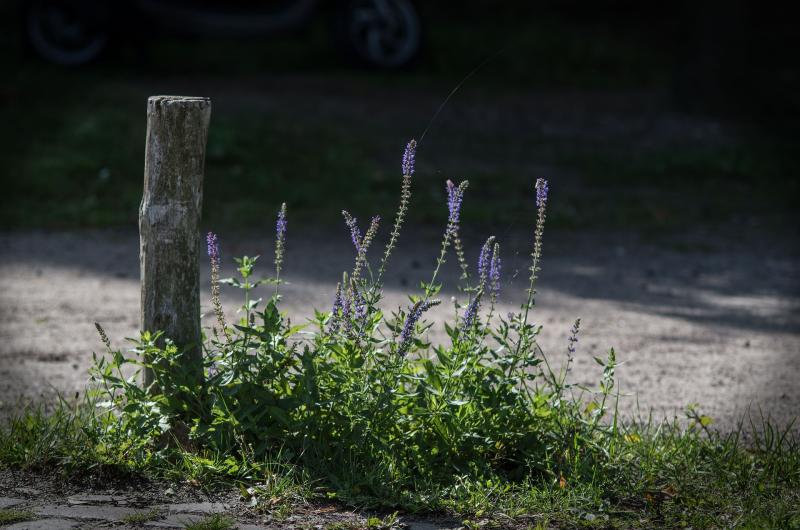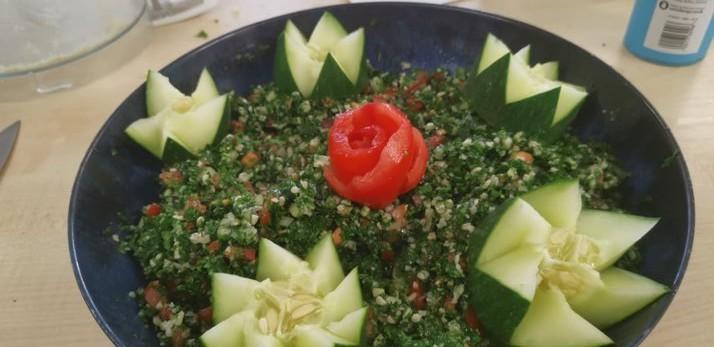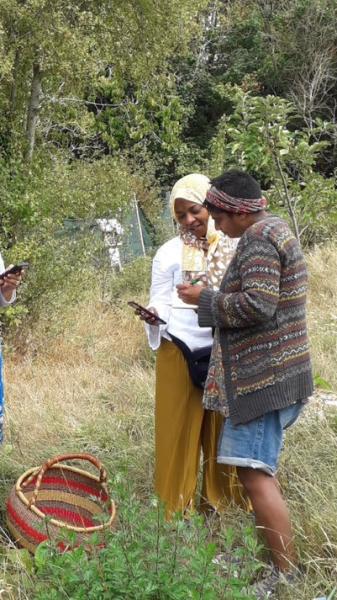Dot Tiwari30 Jan 2023
This summer, Dot collaborated with Oxford City Farm and the Refugee Resources Women’s Service Group in supporting refugee families to engage with nature in their local area. They hosted a workshop that showcased the skills of multi-lingual facilitators of colour, leading sessions from poetry to foraging and cooking to messy art.
Dot explains why creating these kinds of spaces is vital.
Finding a sense of belonging
I want access to nature to be easy for all who live here, regardless of their background. I believe that by enabling refugee and migrant families to spend time in nature, learning more about how we can interact with the nature around us in Britain, exploring nature and how it inspires creativity and offering multiple opportunities for engagement (both passive and active), we can support them to find a sense of belonging in the green spaces in the city.
Barriers to refugees in connecting with nature
There are so many barriers to welcoming BPOC communities into nature spaces. Fear of, and encounters with racism in predominantly white countryside. The cost of travel and the inaccessibility of much of the countryside without a car. Lack of cultural connection with British nature as part of a diaspora community or other migration history. Limited knowledge of right to roam and what access is legally allowed in Britain, and even the fact that it may be culturally alien to spend time in nature just for the sake of being there.
I am a second-generation migrant of colour, with two south Asian migrant parents. I have found that learning about the plants and birds that surround us and more about their folklore is a huge enabler. It gives me additional 'purpose' to go on walks and be in nature, when I haven't grown up with walking in the countryside and wild spaces in the city – in fact I was actively discouraged from doing so by my parents because they were worried for my safety. My own childhood experiences of nature have all been facilitated by white people, and surrounded by white people, and it’s time to change this.
Why workshops matter
Through this workshop, I wanted to share learning and joy from nature, as far as possible through BPOC facilitators coming from similar starting points. We worked with women poets and artists of colour; many of whom have experience of migration and some with experience of being refugees and asylum seekers. The Local Nature Innovation Fund grant enabled us to pay the BPOC facilitators a wage for their work. I wouldn’t have wanted to invite them without paying. It’s a benefit for the participants to see women of colour leading sessions on creativity and nature too.
Workshops aren't only beneficial because they facilitate conversation about what's around us – especially important for integration; but also because it’s a way to deepen a personal connection to the flora and fauna of the waysides, even in cities – which may be alien for those who have been forcibly or otherwise displaced from their homes in different climates. This can support the feeling that wherever you are, you can find familiarity in the wildflowers and weeds that grow amongst the concrete of the city.
Overcoming Isolation
Many of the women in the Refugee Resources Women’s Group are unemployed and spend a lot of time at home. The lack of familiarity and habitude with nature and green spaces and their sense of not belonging in nature also contribute to many of the women spending even more time at home with their children, which deepens their sense of social isolation.
When consulted, the women mostly asked for more free and low-cost activities that are child-friendly during school holidays, especially activities where they can also relax with the other women whilst their kids are engaged.
To meet this need, we used these key tactics:
Food and Foraging
Many of the women love to cook and share food, which is an integral part of their regular meetings. However, the connection between food and the natural environment is limited for many of these women and they have no experience with plants that grow wild in Britain, beyond avoiding plants that sting, nor any experience in seeing food grow here in a nature-friendly manner.
The workshop helped to connect the delicious meals the women made with ingredients they and their children learned about and harvested themselves. They shared knowledge about the wild foods that can be foraged and eaten, and those which have medicinal properties, and saw how food can be grown using nature-friendly, agro-ecological and permaculture methods, as is done at Oxford City Farm.
Sophia, the cookery facilitator explains "the atmosphere in the kitchen was uplifting to have been a part of: convivial, collaborative, industrious, lively and fun. Connections were made, friendships begun. It was a privilege to have been part of it. Some awe-inspiring cooking techniques were employed, and the food was delicious."
Exchange
Nikki from Refugee Resources adds "Using recipes that the women knew was important and empowering to them."
It was exciting to exchange knowledge with the women – finding out about similarities to plants they grew up with, folklore and medicinal properties of plants they are familiar with, and where we have plants that look like plants they have a deeper connection to. We loved supporting women to adapt familiar recipes to use more wild and native foods, which they can share in future cafes and recipe books if they wish. Oxford City Farm is also interested in supporting growing more culturally appropriate foods that would flourish in the garden whilst still being grown with nature-friendly practices.
Nature Walks
Nick, an expert nature walker helped enthuse participants about insects and birdsong. Rasheeqa, the herbalist and foraging walk lead says "it was really lovely having the space and possibility of movement, especially for the kids, so that people could roam as they wished and move between activities. The farm really made it possible."
Adding, "the language barriers are always an issue which means that I’m sometimes unsure how much is being got across effectively in terms of long bits of speaking, so looking at other ways to engage together, sensorily, is maybe good ways to explore these activities - through tasting, touching, feeling… the activities with Nick were such a good example of that, with a learning exercise that people could then go off and practice themselves with the binoculars."
Creativity
We saw the workshop as a way to enable participants with limited connection to nature to explore multiple ways to engage and be inspired – through arts and through food – that can help them find a meaning to interaction with nature that resonates with them – whilst also creating space for people to simply come and sit and be in nature, and passively enjoy the serenity of wilder spaces, in the safe and accessible environment of Oxford City Farm.
We also wanted to use this opportunity to build on a previous successful Refugee Resources project which supported the women to write and perform poetry and art as part of Oxford Human Rights Festival. In discussions with the women afterwards, many were keen to continue writing poetry and artistic expression, and to have more opportunities to perform as well.
Manjot the poetry facilitator says "the natural environment sparked conversations around imagery, metaphor and language. In particular, one herbal plant could be translated from Arabic to mean ‘plant of life’. We spoke about language, power dynamics, relationships and how these relate to cycles and elements of nature in metaphorical ways. Through walking and talking, we were able to engage with poetry from a spoken, conversational and informal way."
Stimulating creativity inspired by nature helps improve skills, foster artistic talent, and also gives women additional ideas of what they can do in nature with their children in their spare time.
Clare the art facilitator sums it up this way "there was an air of kindness and freedom in the space that was almost magical".
Thanks so much to Dot, all the facilitators, Refugee Resources and Oxford City Farm. A magical collaboration!
If you'd like to hear more about this project or about what we learned from the Local Nature Innovation Fund, please contact the Experiments Team.





